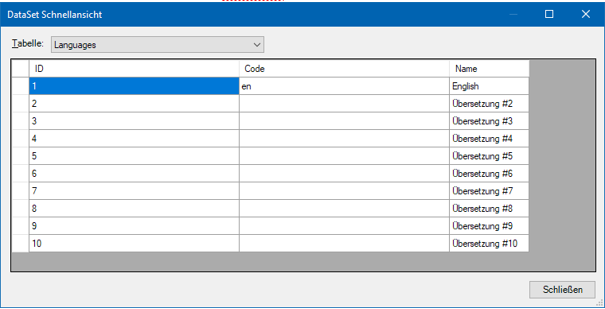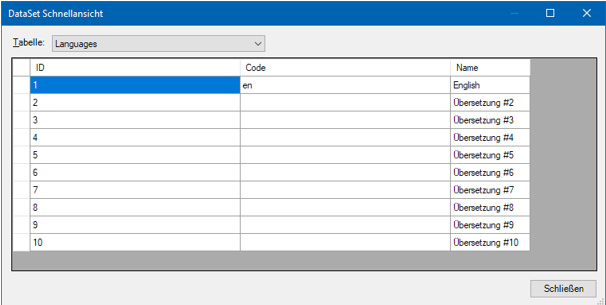eSolution 3rd Party API Translations
For information on maintaining translations with the Hypersoft Item Master, see the chapter Item data AI translation.
Function to retrieve the translations from the item master
DataSet GetTranslationData(string Company, string SerialNumber)
The return is a DataSet consisting of several tables.
Use of the tables:
The DataSet contains a table Languages in which all entered languages are stored.

Matching the ID, 10 further tables "Language1" to "Language10" are included.
Each language table is structured identically with the fields known from the item master

For deviating texts in queries/recipes there is a table LanguageR1-10 with the following structure
| PID | ProductID / option_nr |
| ArticleName | Item name |
| Bontext1 | Bontext 1 |
| Bontext2 | Bontext 2 |
| DescriptionRTF | Description in RTF format |
| AppDescriptionRTF | App description in RTF format |
| DescriptionPlainText | Description text as text |
| AppDescriptionPlainText | App description text as text |
| QueryHeadings |
All possible 16 headings separated by "pipe |
Evaluation:
string[] ab = (...Row["QueryHeadings"].ToString() + "||||||||||||||||").Split('|');
from [0] - from [15] are then the headings 1-16
For deviating texts in queries/recipes there is a table LanguageR1-10 with the following structure:

| PID | PID/Option_nr of the recipe |
| ArtREID | ID from the ArtRE table ( ID from component table ) |
| Name | Translated text |
Mode of operation...
The ID is determined using the abbreviation from the "Language" table.
Here "en" => ID=1 => Table "Language1
From now on, the item is determined by its "PID/OptionNR" with the table "Language1".
If there is no translation for a field or an entire record is not in the table,
the respective text from the original language should be used ( as a fallback )

Matching the ID, 10 further tables "Language1" to "Language10" are included.
Each language table is structured identically with the fields known from the item master

| PID | ProductID / option_nr |
| ArticleName | Item name |
| Bontext1 | Bontext 1 |
| Bontext2 | Bontext 2 |
| DescriptionRTF | Description in RTF format |
| AppDescriptionRTF | App description in RTF format |
| DescriptionPlainText | Description text as text |
| AppDescriptionPlainText | App description text as text |
| DescriptionHTML | Description filled as HTML |
| AppDescriptionHTML | App description filled as HTML |
| QueryHeadings | All 16 headings separated by "pipe |
Evaluation...
string[] ab = (...Row["QueryHeadings"].ToString() + "||||||||||||||||").Split('|');
from [0] - from [15] are then the headings 1-16
For deviating texts in queries/recipes there is a table LanguageR1-10 with the following structure:

| PID | PID/Option_nr of the recipe |
| ArtREID | ID from the ArtRE table ( ID from component table ) |
| Name | Translated text |
Mode of operation...
The ID is determined using the abbreviation from the "Language" table.
Here "en" => ID=1 => Table "Language1
From now on, the item is determined by its "PID/OptionNR" with the table "Language1".
If there is no translation for a field, or an entire record is not in the table, the respective text from the original language should be used to avoid missing texts.
Back to the overarching topic: 3rd party eSolution development